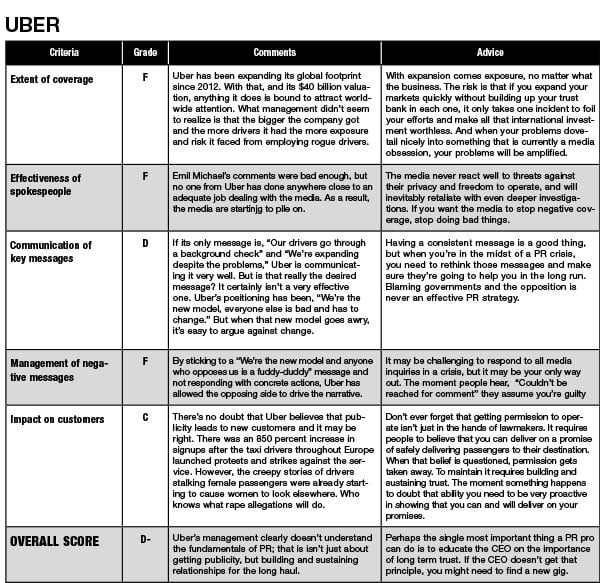
The American Red Cross and Uber are facing severe crises stemming from an erosion in trust. While all organizations need some level of public trust in order to continue to operate, these two brands are dealing with severe issues regarding trust and reputation.
UBER
Based in San Francisco, Uber is an international company whose mobile app connects users with drivers offering rides. Drivers go through a screening process, sign up and they’re in business. Passengers tap the app, which uses a GEO location to determine where they are, and a car arrives within about 10 minutes.
It might be a personal car, or an idle limo. Passengers then rate drivers based on their experience.
But, let’s face it, when you’re in a hurry and need a ride you’re not going to spend a lot of time reading a driver’s reviews.
However, when the media are reporting accusations of rape against an Uber driver in India, while your French office runs a promotion promising to pair Uber riders with “hot chicks,” potential passengers don’t have to look very hard to find information that makes them want to scrap the app altogether.
Senior leadership has not been helpful. After several negative stories appeared in the media, Emil Michael, senior VP of Business, made “off the record” comments at a media dinner suggesting that the way to fix the company’s PR problems is to hire “opposition researchers” to investigate the reporters writing the negative articles. The comments unleashed a storm of protest.
The CEO apologized on Twitter, but the narrative quickly shifted to Uber’s “frat-boy” culture.
AMERICAN RED CROSS
Few other charities are as dependent on the trust of the public as the American Red Cross (ARC). If donors begin to question the effectiveness of their contributions, those donations are bound to dry up.
Which is why the current allegations of money misspent and resources diverted for short-term gain are so damaging. Red Cross officials didn’t do much to bolster confidence when its first response to reporters’ questions was from lawyers who claimed that the details of how the Hurricane Sandy money was spent was a “trade secret.”
When you let the legal department respond to reporters’ questions it may not end well. In the case of the American Red Cross, it made reporters from NPR and ProPublica more determined than ever. So, when they released the results of their investigation (http://n.pr/1wEW1Yy) it was bound to get pick-up up by a broad spectrum of the media.
Both organizations now face the same question: Without a dramatic and well-publicized act of transparency, can either rebuild trust with its constituents? Uber’s fallback defense of saying, “all our drivers pass a background check,” is particularly troubling.
When drivers misbehave, the obvious question is: How thorough is that check?
CONTACT:
Katie Delahaye Paine is CEO of Paine Publishing. She can be reached at [email protected].
This article originally appeared in the December 15, 2014 issue of PR News. Read more subscriber-only content by becoming a PR News subscriber today.


